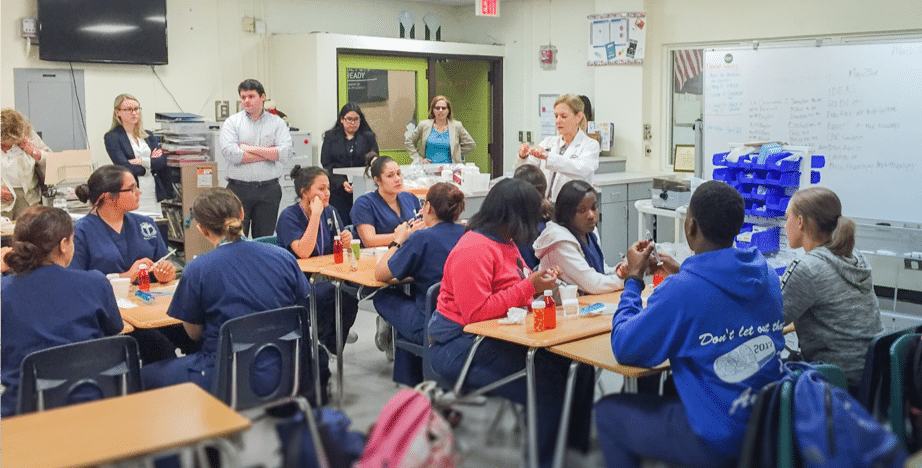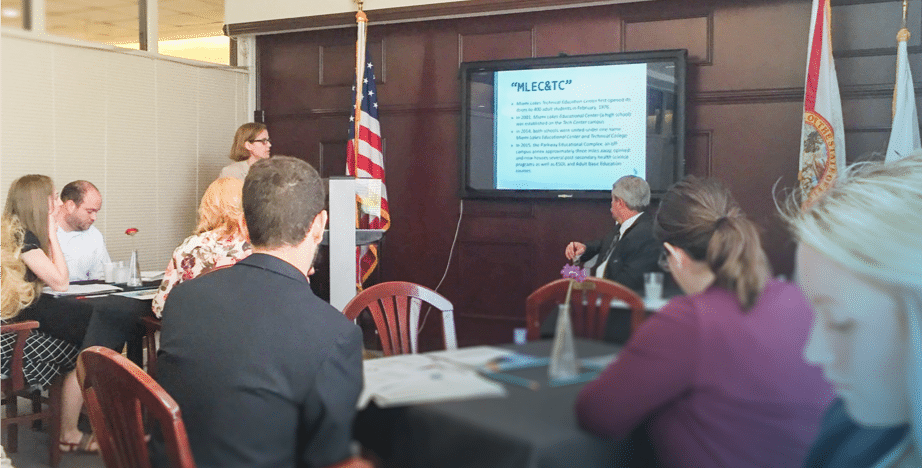Overview
The Arlington Career Center (ACC) is a career and technical educational (CTE) institution established to provide specialized training demanded by a highly sophisticated society. ACC offers academic, enrichment, career, and technical programs to elementary, middle, high school, and adult students Monday through Saturday during the school year and again during a six-week summer enrichment session. Classes begin at 8:35am and end at 2:45pm. During this period, there are three different time blocks of classes whereby all students are transported by school bus from and returned to their home school. The AYPF site visit focused on the programs for high school students, more specifically looking at the role of career and technical education in high school reform.
All Career Center classes are electives and ACC works closely with Arlington’s schools and alternative programs. ACC is an integral part of the program of studies conducted at each of Arlington’s high schools. ACC courses supplement and enrich the Arlington Public Schools’ existing educational programs. The wide variety of curriculum offerings support the state standard and advanced studies diplomas. Both the skills and academic programs at ACC prepare students to continue their formal education or directly enter the labor market after high school. Approximately 60% of Career Center graduates continue their education at colleges, universities, trade schools, and technical institutes. In addition, Arlington high school students who complete a career and technical program articulated with Northern Virginia Community College with a B or better average can earn college credit.
The Arlington Career Center serves over 1,200 students each day. There are 25 career and technical programs offered within three career clusters: Business & Communication, Industry & Engineering, and Health & Human Services. Students have the opportunity to earn elective and science credits, enroll in professional certification programs, and participate in various internships. In addition to the career and technical education courses, there are several academic programs housed at the Arlington Career Center. These programs include:
CRAM (Career Related Academic Modules):
An alternative educational program for high school students who desire a nontraditional instructional program. This program integrates academic course work with students’ vocational/technical training for five periods a day. Team teaching and counseling are utilized to stress personal growth and parental involvement in this program.
Transition 9:
This program is offered to students who must repeat failed courses and enroll in general 9th grade core courses. This program is integral to students and has been extremely successful in that virtually all students who participate for a year will rejoin their classes.
PRIME:
An internship program for gifted high school students with an opportunity to work as interns in professional organizations that relate to their fields of interest. Students are assigned a mentor with whom they spend 150 hours during the year in addition to attending several two-hour seminars. Students must be sixteen years of age and able to provide their own transportation. Students may also take PRIME in the summer for credit.
Welcome from Superintendent of Arlington County Public Schools, Dr. Robert Smith
Dr. Robert Smith shared some important demographic information about Arlington County and offered praise for the work of the Arlington Career Center. Dr. Smith described Arlington County with 18,500 students, only 11% of Arlington county residents are school-aged, and there is no racial majority. The racial breakdown of the county is 47% white, 29% Hispanic, 11% Asian, and 14% Black. Approximately one third of all students receive free/reduced price lunch. Forty percent of students speak English as a second language and roughly 25% of all students receive ESOL (English to Speakers of Other Languages) services. There are 127 different nations and 105 languages represented in the county. Seventy percent are Spanish speakers, followed by Arabic and Mongolian at 4% each.
Arlington Public Schools (APS) has four main goals: 1) expect rising achievement; 2) eliminate achievement gaps; 3) foster an education system that is responsive to students’ needs; and 4) build effective relationships with parents and the larger community. Dr. Smith said that 90% of all APS graduates take at least one CTE course, and 1/3 of graduates are concentrators or program completers in a series of three courses. According to the National Student Clearinghouse along with 2000-2002 follow-up survey conducted by APS, between 80% and 90% of ACC graduates are in higher education.
Dr. Smith stated that career and technical education (CTE) is “integral to what we do and designed for all students, regardless of what students envision doing after high school.” He believes that CTE is extremely important because it offers relevance to the education provided in core academic courses.
Dr. Jerry Caputo (Principal of ACC) and David Welsh (Teacher at ACC)
Dr. Jerry Caputo and Mr. David Welsh welcomed the group and shared the approach to working with students attending ACC. According to Mr. Welsh, “the value of ACC is that students can learn about careers they would enjoy, can learn skills that will help them earn a living, and can become a better person by learning to serve others.” Mr. Welsh is piloting a school-wide grading system (CanDo) with eight teachers. The CTE competencies are directly linked and cross-mapped to the Virginia Standards of Learning (SOL) to offer ACC teachers an opportunity to embed state standards in projects. Mr. Welsh reviewed the breakdown of instructional time by sharing that 30% of time is utilized to review textbook material, 30% on the acquisition of hands-on skills, 30% on real world application and projects, and the remaining 10% on professionalism. He stated, “ACC gives students opportunity to make informed choices.”
Teacher Panel
The AYPF group had the opportunity to hear personal experiences from teachers at ACC. One teacher remarked, “Participation in CTE courses at ACC gives the kids proof positive of why they need core academic courses.” Teachers shared that CRAM was placed at ACC because it tied into the CTE courses offered and most students are enrolled in technical math programs. The director of the Transition 9 program explained this program is integral to students who must repeat failed courses and enroll in general 9th grade core classes. She asserted that the Transition 9 program is extremely successful in that virtually all students who participate for a year will rejoin their classes. ACC is piloting a program for sophomores next year. Upon hearing first-hand from the teacher panel, there was an opportunity for questions addressing the following topic areas:
- Staying current with industry skills
- Role of an Advisory Committee
- Participation in professional development organizations
- Industry partnerships
- Skills USA participation & certification reciprocity
- Depicting the transition from the industry to teacher
- Supportive environment at ACC
- Role of counselors
School Tour
Dr. Caputo led a guided tour of several of the classrooms. Stops included Forensic Science, Communication Arts, Photo, Banking and Finance, Emergency Medical Treatment (EMT), Physical Therapy /Sports Medicine, Building Trades, Animal Science, Auto/Auto Tech, and the TV Studio. ACC offers 25 career pathways in three categories as listed below:
|
Business & Communication |
Industry & Engineering |
Health & Human Services |
|
|
|
Student Panel
The audience had the opportunity to hear from current students enrolled in a number of different programs offered at ACC. The student panel included students enrolled in HVAC, Jr. ROTC, TV Production, Animal Science, and Aviation Technology. One of the remarkable components of the panel was the enthusiasm in which students spoke of ACC. Clearly, ACC had offered programs to keep students engaged, challenged, and thinking about postsecondary options including college, career, or the military. It was quite evident from the student panel that each student was career-focused and quite positive about their experience at ACC.
Lessons Learned
One of the most important lessons learned from this site visit was the relevance evident in all of the learning, career-oriented programs, and soft skills acquired among the student body. Young people are getting the support needed in a number of different career-oriented tracks. Technical knowledge is obtained through project-based learning, and students are able to apply core knowledge under the tutelage of teachers as well as in internship placements.
Another important lesson was evidence that alternative methods of delivery inclusive of both applied and a traditional mode of learning seem to be effective. One student shared that he has a number of different job offers in the area of heating and air conditioning, but would like to join the Marine Corps first. One animal science student spoke of the supportive environment at ACC. One student will be attending Baylor University and continuing aviation classes. When hearing from the students at the panel, it was clear students were enthusiastic about sharing their experiences at ACC and have a clear path upon graduation.
Contact Information
Robert G. Smith
Superintendent
Arlington Public Schools
1426 North Quincy Street
Arlington, VA 22207
703-228-6009
rgsmith@arlington.k12.va.us
Michael Morton
Director, Career, Technical, and Adult Education
Arlington Public Schools
2801 Clarendon Boulevard, #306
Arlington, VA 22201
703-228-7209
mmorton@arlington.k12.va.us
Jerry Caputo
Principal
Arlington Career Center
816 Walter Reed Drive
Arlington, VA 22204
703-228-5800
JCaputo@arlington.k12.va.us
David Welsh
Instructor, Multimedia & Networking
Arlington Career Center
816 Walter Reed Drive
Arlington, VA 22204
703-228-5735
David_welsh@apsva.us
This brief, written by Alisha Scruggs, summarizes a site visit that took place on June 7, 2007.
The American Youth Policy Forum (AYPF), a nonprofit, nonpartisan professional development organization based in Washington, DC, provides learning opportunities for policy leaders, practitioners, and researchers working on youth and education issues at the national, state, and local levels.
AYPF’s events and policy reports are made possible by the support of a consortium of philanthropic foundations: Carnegie Corporation of New York, Bill & Melinda Gates Foundation, WT Grant Foundation, James Irvine Foundation, C.S. Mott Foundation, and others.



